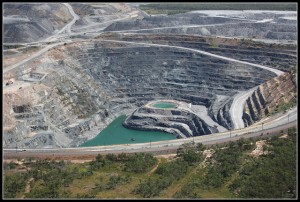Australia’s Paladin Energy has announced that it has ceased production at its Kayelekera mine in Malawi, citing “continuing deterioration in the uranium price” as a reason behind the move.

Image credit: Flickr User: Allan Laurence
The company said on 7 February 2014 that the mine was to be placed on Care and Maintenance status due to depressed uranium prices after reagents and consumables on site had been depleted, which was expected to be by April/May of this year.
Accordingly, Paladin Energy yesterday issued a media release informing that uranium production at the mine ceased on 21 May.
Paladin Energy’s Kayelekera mine in Malawi produces 3.3 million pounds of uranium per year. The company said that they will only activate it again — a process which takes nine months — when uranium prices rise to $70–75 per pound, or nearly triple the going rate.
Uranium prices have been hit by a series of misfortunes over the past few years, causing them to slide from $140 per pound in 2007 to just under $30 per pound this year.
The global financial crisis, the massive decommissioning of weapons-grade uranium and the Fukushima nuclear disaster in Japan, which inspired mass nuclear phase-outs in Germany and Switzerland, were all contributing factors to the demise of uranium prices in recent times, which saw BHP Billiton put off a $20-billion expansion plan for a mine that sits on the world’s largest known uranium deposit.
According to the article on Quartz, French nuclear group Areva has signed a uranium mining deal with the Government of Niger, but has also immediately postponed the start of the project until prices improve.
“Neither Areva nor Niger are interested in dumping uranium on the market that would not find a buyer,” Areva boss Luc Oursel said.
Paladin Energy expects uranium prices to reach acceptable levels no sooner than 2016.


















